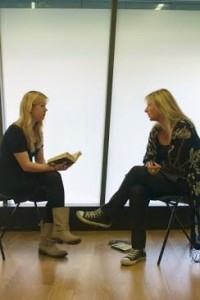
Taking Advantage of Opportunities at Audition Doctor
When asked the question “Why rehearse?”, Simon Russell Beale replied: “Very often we’re dealing with works of great complexity and great depth and I think its courteous to spend that amount of time figuring out what Shakespeare or Shaw wanted to do and that applies to new plays too. It’s a more complicated procedure than most people probably think. It’s not just a question of where you stand and getting the lines out in the right order. It has to be developed in a much more organic way than that and that’s what that time is spent doing. [An actor’s job] is to find the emotional and intellectual path through our various characters and our relationships and that actually requires quite a lot of delicate piecemeal work which takes time.”
The influx of students at Audition Doctor begins earlier every year which reflects both the conscientious nature of drama school applicants and the highly competitive nature of getting a place. Those who get further on in the process are often those who have taken advantage of all the chances offered to better their craft. This inevitably takes continual graft over a period of time and Audition Doctor is one such opportunity. It is rare in the sense that it is totally focused on you. Schemes such as those offered on Ideastap are almost always group lessons. They are undoubtedly brilliant, however, places are strictly limited and usually one-off which makes progress hard to gauge. Consistent lessons at Audition Doctor are an investment because students are able to see a clear upward trajectory in their development as an actor. The delicate piecemeal work that Russell Beale speaks of is difficult to do alone and Audition Doctor sessions give you the freedom to explore difficult texts with professional help.
The RSC’s Casting Director, Hannah Miller, was talking recently of giving 24 young and emerging actors the chance to learn the text, voice and movement exercises used by the RSC when approaching classical texts. Similar to Audition Doctor, she mentioned that the sessions were “not just teaching techniques for classical work. It’s about working with the words that have been written. The writer has done everything for a reason. You need to observe that, take clues, ask questions and deconstruct the text to find out what it means to you, given your understanding of that character. That is the just the same for a naturalistic piece of work written two years ago as it is for a classical text.”
The reason why many students come to Audition Doctor is due to the perceived difficulties they face when approaching a Shakespeare text – an unavoidable necessity for drama school auditions. Miller went onto say: “Of course, there are different challenges with classical texts. We might not actually know what those words mean. It is alien to the way that we speak and understand language.” Audition Doctor sessions instills confidence and removes the fear from Shakespeare which is invaluable in the actual audition when being redirected and asked to experiment with the language.
Miller stated that the RSC was looking for individuals “with an open mind. With creativity, truth in their performances and technique” and it is this that Audition Doctor equips each one of her students with prior to auditions.




